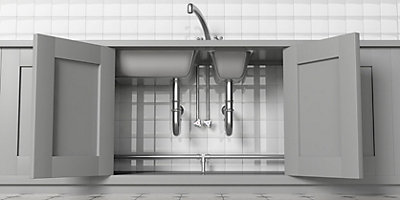Does High Water Pressure Damage Plumbing?

The water pressure in your house measures how fast water travels through your pipes and out of your faucets. Normally, the standing residential house has a water pressure of around 80 PSI (pounds per square inch). Anything above 80 PSI is considered too high and can cause serious damage to your pipes and equipment.
Keep reading below to learn more about the effects of high-water pressure.
What Causes High Water Pressure?
There are several reasons why your home can have high water pressure. Living at the bottom of a hill is one of the most common causes since water naturally flows downhill. Water running downhill can cause large ponding buildup, leading to high water pressure in your pipes.
Secondly, your water company may run high water pressure in your area, based on the requirements of your location. This usually happens if you live near large buildings or fire hydrants. Higher water pressure allows water to travel through bigger buildings or to burst quickly from fire hydrants.
Finally, your water heater could generate high water pressure as your pipes thermally expand with warm water.
What Happens if Your Water Pressure Is Too High?
Water streaming through your pipes at high pressure can damage the integrity of your pipes, leading them to erode more quickly.
High water pressure can even instantly destroy pipes in your house. Protective plumbing devices called internal air chambers shield your pipes from damage when you turn and turn off your water. High water pressure, however, can bypass those chambers and ruin pipe joints, valves, and fixture heads.
What are the Signs of High-Water Pressure?
If you’re worried that the water pressure in your house is too high, look for these key signs:
- Pipes leaking throughout your house
- Water spitting out of the sink when you turn on the faucet
- Banging pipes
- Frequent repairs or replacements needed for large appliances
How Do I Reduce Water Pressure in My Pipes?
If you notice high water pressure in your home and are concerned about the repercussions above, consider the following steps to reduce the water pressure in your pipes:
- Regularly test your water pressure using a pressure gauge. Knowing your optimal water pressure helps prevent future damage.
- If you believe your water pressure is too high, it’s best to call a licensed contractor to install a water pressure regulator.
Plumbline serves the plumbing, heating, cooling, and electrical needs of Coloradans in Greater Denver and Northern Colorado including Boulder, Fort Collins and more. If you have questions about high water pressure or any other plumbing needs, call us at 303-436-2525 to schedule an appointment today.
Need help from a Colorado Plumbing, Heating, Cooling, or Electrical Specialist?
For your convenience, you can request an appointment in one of two ways:
- Call us at (303) 436-2525 for immediate assistance.
- Click on the button below to schedule your appointment online.
Related Reading
Join Our Email Newsletter
Receive updates, current news, promotions, and industry tips.
